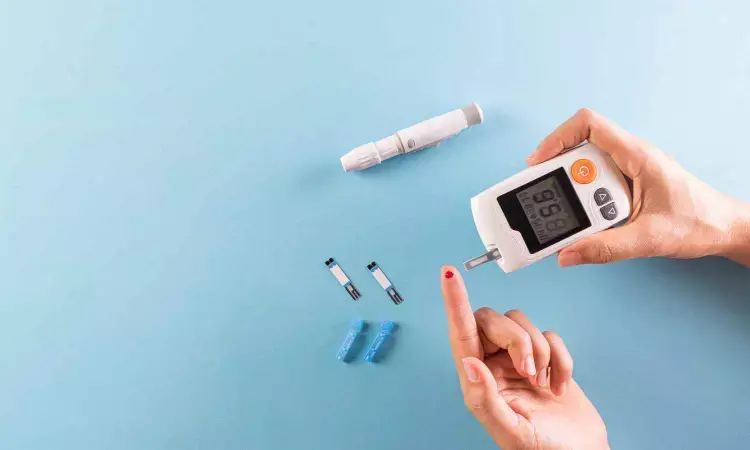- Home
- Medical news & Guidelines
- Anesthesiology
- Cardiology and CTVS
- Critical Care
- Dentistry
- Dermatology
- Diabetes and Endocrinology
- ENT
- Gastroenterology
- Medicine
- Nephrology
- Neurology
- Obstretics-Gynaecology
- Oncology
- Ophthalmology
- Orthopaedics
- Pediatrics-Neonatology
- Psychiatry
- Pulmonology
- Radiology
- Surgery
- Urology
- Laboratory Medicine
- Diet
- Nursing
- Paramedical
- Physiotherapy
- Health news
- Fact Check
- Bone Health Fact Check
- Brain Health Fact Check
- Cancer Related Fact Check
- Child Care Fact Check
- Dental and oral health fact check
- Diabetes and metabolic health fact check
- Diet and Nutrition Fact Check
- Eye and ENT Care Fact Check
- Fitness fact check
- Gut health fact check
- Heart health fact check
- Kidney health fact check
- Medical education fact check
- Men's health fact check
- Respiratory fact check
- Skin and hair care fact check
- Vaccine and Immunization fact check
- Women's health fact check
- AYUSH
- State News
- Andaman and Nicobar Islands
- Andhra Pradesh
- Arunachal Pradesh
- Assam
- Bihar
- Chandigarh
- Chattisgarh
- Dadra and Nagar Haveli
- Daman and Diu
- Delhi
- Goa
- Gujarat
- Haryana
- Himachal Pradesh
- Jammu & Kashmir
- Jharkhand
- Karnataka
- Kerala
- Ladakh
- Lakshadweep
- Madhya Pradesh
- Maharashtra
- Manipur
- Meghalaya
- Mizoram
- Nagaland
- Odisha
- Puducherry
- Punjab
- Rajasthan
- Sikkim
- Tamil Nadu
- Telangana
- Tripura
- Uttar Pradesh
- Uttrakhand
- West Bengal
- Medical Education
- Industry
High-protein diet may enhance glycemic control by boosting peripheral insulin levels, finds study

A study published in Diabetes, Obesity, and Metabolism found that a high-protein diet may enhance glycemic control by boosting peripheral insulin levels.
High-protein diets have been recognized as a potential strategy in the nutritional management of type 2 diabetes (T2D). Mycoprotein is a high-fibre, high-protein food ingredient previously shown to improve acute glycaemic control.
We determined whether incorporating mycoprotein into a high-protein vegan diet would improve glycaemic control to a greater extent than an isonitrogenous omnivorous diet in people with T2D.
Seventeen adults (f = 5, age = 58.3 ± 8.3 years, BMI = 32.9 ± 4.7 kg∙m−2, HbA1c = 60 ± 15 mmol∙mol−1) with T2D were randomly allocated to a 5-week eucaloric high-protein (30% energy from protein) diet, either an omnivorous diet (OMNI; 70% protein from omnivorous sources) or an isonitrogenous, mycoprotein-rich, vegan diet (VEG; 50% protein from mycoprotein). Glycaemic control was assessed using a two-step hyperinsulinaemic-euglycaemic clamp (HEC) with D-[6,6-2H2] glucose infusion, a mixed-meal tolerance test (MMTT) and continuous glucose monitoring.
Results: The rate of glucose disappearance (RdT), glucose disposal rate and endogenous glucose production, as well as postprandial time-course of blood glucose, serum insulin and C-peptide were assessed during the HEC and MMTT, respectively. Both groups had improved peripheral insulin sensitivity (intervention effect, p = 0.006; increased RdT/Insulin of 1.0 ± 0.6 and 1.0 ± 0.3 mg kg−1 min−1 in OMNI and VEG, respectively), HbA1c (intervention; p = 0.001) and glycaemic variability (intervention; p = 0.040; increased time in-range of 11.8 ± 9.3% and 23.3 ± 12.9% in OMNI and VEG). There were no improvements in hepatic insulin sensitivity or in postprandial blood glucose and serum C-peptide (p > 0.05) during the MMTT.
Conclusions
High-protein diets, whether predicated on vegan or omnivorous proteins, can improve glycaemic control by increasing peripheral insulin sensitivity in people with T2D.
Reference:
Whelehan G, Dirks ML, West S, et al. High-protein vegan and omnivorous diets improve peripheral insulin sensitivity to a similar extent in people with type 2 diabetes. Diabetes Obes Metab. 2024; 1-10. doi:10.1111/dom.16100
Dr. Shravani Dali has completed her BDS from Pravara institute of medical sciences, loni. Following which she extensively worked in the healthcare sector for 2+ years. She has been actively involved in writing blogs in field of health and wellness. Currently she is pursuing her Masters of public health-health administration from Tata institute of social sciences. She can be contacted at editorial@medicaldialogues.in.
Dr Kamal Kant Kohli-MBBS, DTCD- a chest specialist with more than 30 years of practice and a flair for writing clinical articles, Dr Kamal Kant Kohli joined Medical Dialogues as a Chief Editor of Medical News. Besides writing articles, as an editor, he proofreads and verifies all the medical content published on Medical Dialogues including those coming from journals, studies,medical conferences,guidelines etc. Email: drkohli@medicaldialogues.in. Contact no. 011-43720751


